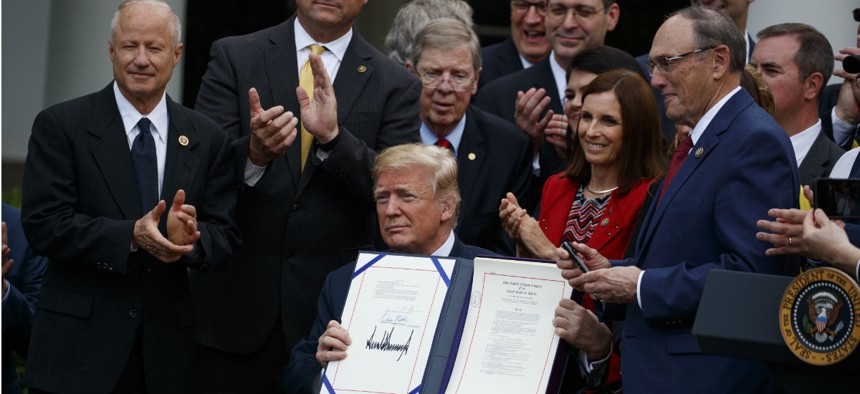Congress Looks to Boost Accountability for VA’s Senior Execs, Loosen It for Everyone Else
Bipartisan bill in the Senate would unwind Trump’s top legislative achievement on civil service reform.
The top career civil servants at the Veterans Affairs Department will soon face increased scrutiny over their relocations, with lawmakers passing a bill they say will crack down on senior executives who abuse the benefits associated with internal transfers.
The VA Senior Executives Accountability Act (S. 2382), which was presented to President Trump for his signature this week, will have a twofold benefit, according to its supporters. The measure will eliminate executives’ use of reassignments for personal gains and prevent the department from moving managers around rather than disciplining them.
Lawmakers expressed concern over the Appraised Value Offer Program, which VA uses to recruit and relocate employees for mission critical positions. The program is run by a private company that contracts with the General Services Administration to help employees who are relocating to find a purchaser for their old home. The company will buy it outright for a fair market price if a third-party buyer is not identified quickly enough.
An inspector general report in 2015 found VA’s senior executives were improperly taking advantage of the program and other relocation incentives for their own financial gains. Diana Rubens, senior executive director of the Veterans Benefits Administration's Philadelphia office, was accused of abusing her authority to secure a transfer from Washington, D.C., to her current position, along with nearly $310,000 in relocation costs, including more than $200,000 through the appraised value offer program. The IG report led to VA suspending the program, but the department reinstated it in November 2016.
The reauthorization of the program was done “quietly” and with no “implementation policy to avoid abuse,” according a Senate report accompanying the bill.
The measure will also require the VA secretary to approve all SES reassignments “to ensure that such moves are justified and are in the best interest of the department, veterans and taxpayers.” VA will report to Congress semiannually to update it on all senior executives who were reassigned and the associated costs. In addition to shining a light on potential abuses in spending, lawmakers said the increased scrutiny will discourage VA leaders from transferring SES employees to different positions rather than taking them through the disciplinary process.
Loosening Accountability
In a surprising move, a Republican lawmaker on Thursday introduced a bill to repeal President Trump’s signature civil service legislative accomplishment to date, the VA Whistleblower Protection and Accountability Act. The measure made it easier to fire all VA employees by shortening the timeframe for due process and lessening the burden of proof required to prove a termination was warranted.
The implementation of that bill, however, has drawn bipartisan concern. Government Executive has reported that the increased firing authority has disproportionately focused on lower-ranking VA employees, and lawmakers subsequently complained to VA about the law’s enforcement. A group of Democratic senators said in a letter to then-Secretary David Shulkin that new policies have led to employees being fired for “missing deadlines or moving slowly after an injury,” even on first offenses. Such actions “are not the types of offenses that rise to the level of immediate termination,” an authority provided in the law, the senators said.
The criticism came despite unanimous support for the measure in the Senate and opposition from only a few dozen House lawmakers, nearly all of whom were Democrats. Fitzpatrick himself voted in favor of the bill. Rep. Anthony Brown, D-Md., who voted against the bill, and Rep. Chris Smith, R-N.J., who voted for it, co-sponsored the repeal measure.
The American Federation of Government Employees, which represents 230,000 VA employees and opposed the firing bill from its inception, praised Fitzpatrick’s repeal bill.
“As we near the one-year anniversary of the so-called ‘Accountability Act,’ and can now see the law’s disproportionate impact on rank-and-file workers—a majority of whom are veterans, women, and minorities—it’s great to see members of Congress take action to right that wrong,” said J. David Cox, AFGE’s president.
Trump has repeatedly praised the law, including earlier this month when signing a bill to overhaul VA health care. At the signing ceremony, Trump falsely said that federal employee unions like AFGE had eventually come around to supporting the measure.
“Last year, I signed the historic VA Accountability legislation, meaning you now can immediately get rid of people that don't treat our veterans right; that rob us, or cheat us, or aren't good to our great vets,” Trump said. “You can get them out. You couldn't do it.”
Even if the lawmakers usher the repeal through Congress, they will likely face a resistant president.
When malfeasance was uncovered at VA, “They couldn't do anything about it,” Trump said at the signing ceremony. “Good people that worked there, they couldn't take care of the bad people. Meaning, you're fired; get the hell out of here.”
NEXT STORY: Retirement Facts: A True-False Quiz




